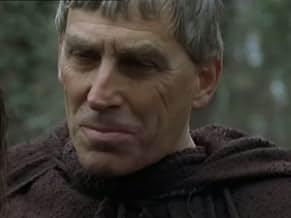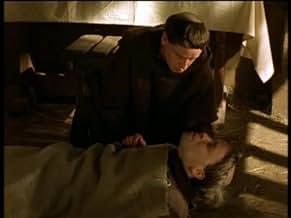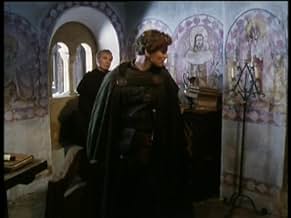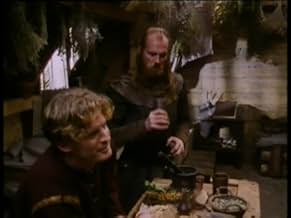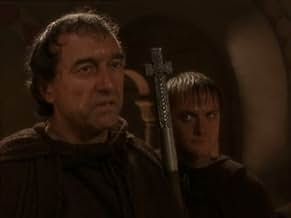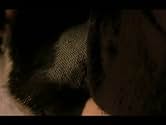Ajouter une intrigue dans votre langueThe medieval era cases of a Crusader-turned-Monk who investigates mysteries in the Norman English town of Shrewsbury.The medieval era cases of a Crusader-turned-Monk who investigates mysteries in the Norman English town of Shrewsbury.The medieval era cases of a Crusader-turned-Monk who investigates mysteries in the Norman English town of Shrewsbury.
Parcourir les épisodes
Avis à la une
A literate and highbrow series about a medieval herbalist monk who uses his knowledge to solve crimes. More interesting and much less voyeuristic than CSI and kindred shows.
Most of the previous reviewers did a good job of describing the nature of the series and how truly well acted and off beat it is. Rather than reiterate their commentary, I would like to focus on the show's realistic portrayal of the times. The vast majority of medieval films and/or shows go to inaccurate extremes. In the 50s and 60s, all the women wore brassieres and had Lady Clairol hairdos. The guys were all clean shaven Brylcream men with slicked back pompadours. And everyone's clothes looked freshly pressed and drycleaned. In the 70s, the trend went to the other extreme. All, even the well off, were dressed in filthy, tattered clothes and looked as if they did indeed bathe daily---in a vat of manure. Lots of teeth were missing from every mouth and every face covered with running sores. There was no middle ground between the squeaky clean people and places of the 50s "Robin Hood" series (a good adventure show nonetheless) and the comically exaggerated filth and squalor of Monty Python's "Jabberwocky."
The Cadfael series provided that balance. The set designs and costumes were very accurate renderings of what actually existed at the time, and the series credibly demonstrated how people of that era went about their daily business and social lives. Many, especially the poor, were certainly ragged and unkempt, but few, rich or poor, were oblivious to the appearance of their homes or themselves. Another aspect of this show missing from most similar efforts was it's attempt to show how the tradespeople and middle class of the time worked and lived. Most "medieval" films perpetuate the myth that society was strictly divided into "have everythings" and "have nothings". Everyone is either an aristocrat or a starving, oppressed serf dressed in rags. This show actually gives the viewer an idea of how much more varied and complex medieval society really was.
A first rate show, even more so for the historically literate. Although some of the later episodes hobbled their plots with ponderous soap opera "blasts from the past" from Cadfael's former life as a crusader, I was sad to see the series end. I never read any of the books, but understand that there are still a few that have not been filmed. I would love to see the series revived, although this winning combination of casting and production would be hard to repeat and harder still to beat.
Most of the previous reviewers did a good job of describing the nature of the series and how truly well acted and off beat it is. Rather than reiterate their commentary, I would like to focus on the show's realistic portrayal of the times. The vast majority of medieval films and/or shows go to inaccurate extremes. In the 50s and 60s, all the women wore brassieres and had Lady Clairol hairdos. The guys were all clean shaven Brylcream men with slicked back pompadours. And everyone's clothes looked freshly pressed and drycleaned. In the 70s, the trend went to the other extreme. All, even the well off, were dressed in filthy, tattered clothes and looked as if they did indeed bathe daily---in a vat of manure. Lots of teeth were missing from every mouth and every face covered with running sores. There was no middle ground between the squeaky clean people and places of the 50s "Robin Hood" series (a good adventure show nonetheless) and the comically exaggerated filth and squalor of Monty Python's "Jabberwocky."
The Cadfael series provided that balance. The set designs and costumes were very accurate renderings of what actually existed at the time, and the series credibly demonstrated how people of that era went about their daily business and social lives. Many, especially the poor, were certainly ragged and unkempt, but few, rich or poor, were oblivious to the appearance of their homes or themselves. Another aspect of this show missing from most similar efforts was it's attempt to show how the tradespeople and middle class of the time worked and lived. Most "medieval" films perpetuate the myth that society was strictly divided into "have everythings" and "have nothings". Everyone is either an aristocrat or a starving, oppressed serf dressed in rags. This show actually gives the viewer an idea of how much more varied and complex medieval society really was.
A first rate show, even more so for the historically literate. Although some of the later episodes hobbled their plots with ponderous soap opera "blasts from the past" from Cadfael's former life as a crusader, I was sad to see the series end. I never read any of the books, but understand that there are still a few that have not been filmed. I would love to see the series revived, although this winning combination of casting and production would be hard to repeat and harder still to beat.
Cadfael is a medieval detective series set in mid-12th Century Shrewsbury against the backdrop of a devastating civil war. It is based on the entertaining and popular series of novels by Ellis Peters, the pseudonym of Edith Pargeter. The protagonist is a Benedictine monk, Brother Cadfael, the crusader-turned-herbalist at the monastery of St. Peter and St. Paul, who finds that the only way to get justice for the corpses that come under his care is to investigate the murders himself.
Many of the intricacies and sub-plots that brought such life to the source material are cut out to fit the stories into 75 minutes. Only 13 episodes of the 20 available books were filmed, which is a shame, although from reading the entire series I would say that arguably the best stories got through. The adaptations are good despite their limitations, but it is noticeable when the original (and superior) dialogue is used. The sets and costumes look great and the Hungarian location is a more than adequate substitute. The authenticity in the series is much higher than in most films set in the era.
The role of Brother Cadfael is played brilliantly by Sir Derek Jacobi, who delivers a performance that really brings out the different facets of the complex character of a former crusader and sailor who settles for a quiet life in a monastery. Though he was not the first choice for the role, it is hard to see how anyone could have improved upon his work except to perhaps bring out more of the Welshman in him. The support is mostly excellent, with actors such as Terence Hardiman, Julian Firth, Michael Culver etc. turning in memorable performances. It is a shame that they could not have had more consistent casting of law man Hugh Beringar and it is not just the actor that changed – he went from being a level-headed and intelligent man in the Sean Pertwee era to someone who believed in testing guilt by throwing the accused in a river during the Anthony Green phase! Unfortunately occasionally there is some unintentional hilarity from the poor dubbing of the Hungarian extras.
Cadfael is worth seeking out if for no other reason than because it is a refreshing change from the CSI-type mysteries that fill our screens, with a different setting and a focus on knowledge of human behaviour rather than forensics (though Cadfael is well ahead of his time in the latter discipline!).
Many of the intricacies and sub-plots that brought such life to the source material are cut out to fit the stories into 75 minutes. Only 13 episodes of the 20 available books were filmed, which is a shame, although from reading the entire series I would say that arguably the best stories got through. The adaptations are good despite their limitations, but it is noticeable when the original (and superior) dialogue is used. The sets and costumes look great and the Hungarian location is a more than adequate substitute. The authenticity in the series is much higher than in most films set in the era.
The role of Brother Cadfael is played brilliantly by Sir Derek Jacobi, who delivers a performance that really brings out the different facets of the complex character of a former crusader and sailor who settles for a quiet life in a monastery. Though he was not the first choice for the role, it is hard to see how anyone could have improved upon his work except to perhaps bring out more of the Welshman in him. The support is mostly excellent, with actors such as Terence Hardiman, Julian Firth, Michael Culver etc. turning in memorable performances. It is a shame that they could not have had more consistent casting of law man Hugh Beringar and it is not just the actor that changed – he went from being a level-headed and intelligent man in the Sean Pertwee era to someone who believed in testing guilt by throwing the accused in a river during the Anthony Green phase! Unfortunately occasionally there is some unintentional hilarity from the poor dubbing of the Hungarian extras.
Cadfael is worth seeking out if for no other reason than because it is a refreshing change from the CSI-type mysteries that fill our screens, with a different setting and a focus on knowledge of human behaviour rather than forensics (though Cadfael is well ahead of his time in the latter discipline!).
10jfrada
I first watched this show believing it would be another dull British detective story, I was wrong it was an excellent show about a medieval monk who uses deductive reasoning to solve murders. The show also gives you a sense of what life was like in the middle ages. A lot of medieval stories concentrate on brutality of the times while this one shows the day to day affairs of normal people, the culture ,the church, the politics and how it affects the murder of the victims.
I have since read the Ellis Peters novels and quite simply this is one case where the TV show is better than the books it was based on. I highly recommend watching this show if you like murder mysteries.
I have since read the Ellis Peters novels and quite simply this is one case where the TV show is better than the books it was based on. I highly recommend watching this show if you like murder mysteries.
My vote for this series would be an 8 out of 10. It's fairly accurate to the book and I think I actually enjoy the series more. It got rather strange when the actor playing Hugh Beringar kept changing, Sean Pertwee (from the premier season) portrayed him the best. Some of the later episodes fell short of my expectations and sometimes the extras' voices were quite obviously dubbed in, but all in all it was quite an entertaining show.
Cadfael is, in my opinion, one of the best sleuths in the category of mystery-solvers. He really is a very enjoyable character. And Derek Jacobi does a wonderful job in portrayal. The stance, the voice, the entire person is so true to the book. This is one must-see mystery series!
Le saviez-vous
- AnecdotesSeveral of the names and occupations of the monks in the series are actually from a record book from the Abbey of St. Peter and St. Paul in Shrewsbury, England. Some of these include Cadfael, Robert, Jerome, and Heribut.
- GaffesFemale characters are invariably exquisitely made up with the most modern tones of foundation, blusher and lipstick. After HD was introduced this became more noticeable.
- ConnexionsFeatured in Drama Trails: 'Secret Diary of a Call Girl' to 'London's Burning' (2008)
Meilleurs choix
Connectez-vous pour évaluer et suivre la liste de favoris afin de recevoir des recommandations personnalisées
Détails
Contribuer à cette page
Suggérer une modification ou ajouter du contenu manquant









